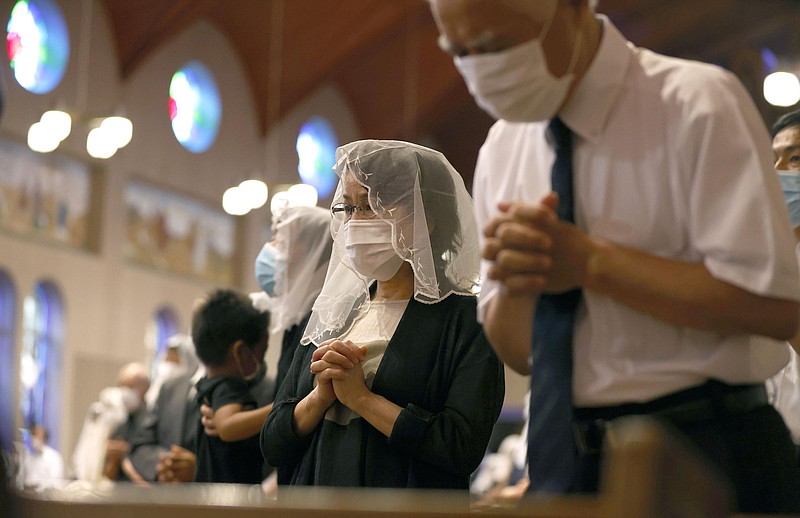TOKYO -- The Japanese city of Nagasaki on Sunday marked the 75th anniversary of the U.S. atomic bombing, with the mayor and dwindling survivors urging world leaders including their own to do more for a nuclear weapons ban.
At 11:02 a.m., the moment the B-29 bomber Bockscar dropped a 4.5-ton plutonium bomb dubbed "Fat Man," Nagasaki survivors and other participants stood in a minute of silence to honor more than 70,000 dead.
The Aug. 9, 1945, bombing came three days after the United States dropped its first atomic bomb on Hiroshima, the world's first ever nuclear attack, which killed 140,000. On Aug. 15, Japan surrendered, ending World War II.
[Video not showing up above? Click here to watch » https://www.youtube.com/watch?v=_shLkAW_abQ]
At the event at Nagasaki Peace Park, scaled down because of the coronavirus pandemic, Mayor Tomihisa Taue read a peace declaration in which he raised concern that nuclear states had in recent years retreated from disarmament efforts.
Instead, they are upgrading and miniaturizing nuclear weapons for easier use, he said. Taue singled out the U.S. and Russia for increasing risks by scrapping the Intermediate-Range Nuclear Forces Treaty.
"As a result, the threat of nuclear weapons being used is increasingly becoming real," Taue said. Noting that the Nuclear Proliferation Treaty entered into force 50 years ago, Taue urged the U.S. and Russia to show a "workable way" toward their nuclear disarmament at the treaty review process next year.
He said that "the true horror of nuclear weapons has not yet been adequately conveyed to the world at large" despite struggle and efforts by hibakusha, or atomic bombing survivors, to make Nagasaki the last site of such a tragedy.
He also urged Japan's government and lawmakers to quickly sign the 2017 Treaty on the Prohibition of Nuclear Weapons.
Aging survivors have expressed a growing sense of urgency to tell their stories, in hopes of reaching younger generations to continue their effort toward establishing a nuclear-free world.
"There is not much time left for us survivors," said Shigemi Fukabori, 89. He was a 14-year-old student mobilized to work at a shipyard when Nagasaki was bombed.
"I'm determined to keep telling my story so that Nagasaki will be the last place on Earth to have suffered an atomic attack," he said.
Fukabori, who almost instantly lost four siblings, said he never forgets the pile of charred bodies, bombed-out streetcars and the badly injured desperately crying for help and water as he rushed back to his house in the back of the Urakami Cathedral, which was also nearly destroyed.
"We don't want anyone else to have to go through this," he said.
After taking part in Sunday's ceremony, Prime Minister Shinzo Abe criticized the prohibition treaty for not being realistic. None of the nuclear states has joined, and it is not widely supported even by nonnuclear states, he said.
"The Treaty on the Prohibition of Nuclear Weapons was adopted without taking into consideration the reality of the harsh national security environment," Abe said at a news conference. "I must say the treaty is different from Japan's position and approach," even though they share the same goal of abolishing nuclear weapons, he said.
Abe has repeatedly refused to sign the treaty. He reiterated that Japan's approach is not to take sides but to serve as a bridge between nuclear and nonnuclear states to encourage dialogue to achieve a total ban.
[Gallery not loading above? Click here for more photos » arkansasonline.com/810anniversary/]
While Tokyo renounces its own possession, production or hosting of nuclear weapons, as a U.S. ally, Japan hosts 50,000 American troops and is protected by the U.S. nuclear umbrella. The post-WWII security arrangement complicates the push to get Japan to sign the treaty as it beefs up its own military to deal with threats from North Korea and China, among others.









